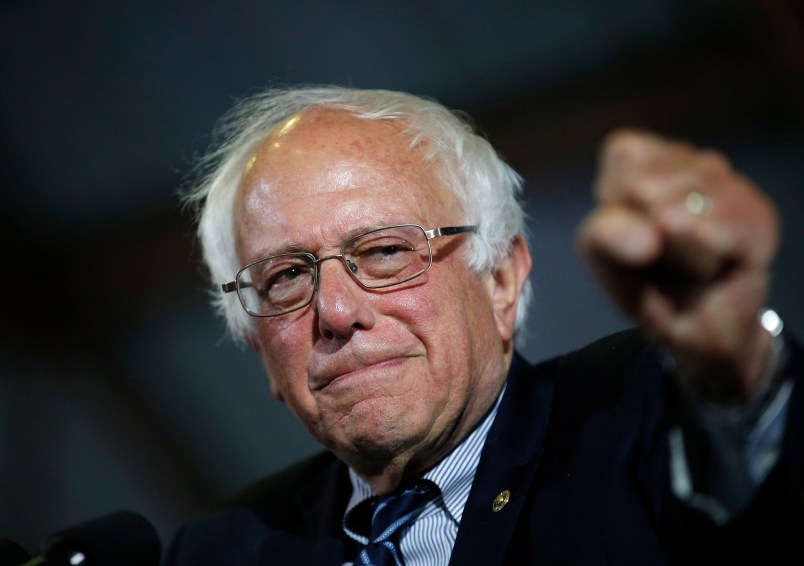PHILADELPHIA (AP) — The role of superdelegates could be significantly reduced in future Democratic presidential primaries under a compromise deal struck at the Democratic National Convention rules committee Saturday.
Efforts by Bernie Sanders supporters to pass amendments eliminating or limiting the power of superdelegates failed to win approval at the committee meeting in Philadelphia. But campaigns for Sanders and Hillary Clinton worked out an agreement to create a “unity commission” to revise the nominating process, including changing superdelegate rules, which won near-unanimous support.
The 21-member commission will study a number of issues, including how to improve access to caucuses and how to broaden the party’s appeal. For superdelegates, the commission’s recommendation is that Congress members, governors and other elected officials should remain as unpledged delegates, but that other delegates would be bound proportionally to the primary results of their state.
Sanders campaign manager Jeff Weaver endorsed the plan, saying it would “result in the reduction of superdelegates as we know them by two-thirds.” The Clinton campaign also expressed support for the commission.
Any changes to superdelegate rules would still be subject to DNC approval. A report by the commission is due by Jan. 1, 2018.
The compromise came after a lengthy meeting in which Sanders supporters grew increasingly frustrated as their efforts on superdelegates were voted down.
Discussing the proposal to eliminate superdelegates, Aaron Regunberg, a Sanders delegate and a Rhode Island lawmaker, argued that the current system does not reflect “our core values.” But Clinton supporters argued that the superdelegate system brings more people into the political process and instead called for a more extensive review of the nominating process.
The amendments did win enough support to potentially move on to the convention floor for votes next week. But conflict on the floor appeared unlikely. Calling the compromise a “step forward,” Regunberg said they had not filed a so-called minority report to pursue a floor fight on the amendment to abolish superdelegates.
Sanders has been critical of superdelegates during his contentious primary fight with Clinton. His supporters argue that Clinton’s substantial superdelegate lead may have influenced the outcome of the race, although Clinton also led Sanders with pledged delegates. Late in the race, Sanders sought to flip superdelegates, but with little success.
There are 713 superdelegates, mainly members of Congress and members of the Democratic National Committee. Clinton leads Sanders with superdelegates 602-48. Combining pledged delegates and superdelegates, Clinton leads 2,807 to 1,894.
A collection of liberal organizations and Sanders backers held a news conference before the hearing, stressing their opposition to superdelegates. Supporters crowded the conference room where the hearing was held, with more people packed in an outside hallway, cheering and chanting.
With the convention just days away, the hearing was one of the last opportunities for Sanders’ supporters to push their agenda. The party platform debate concluded recently with a draft document that included many of Sanders’ priorities, including proposals for a $15-an-hour federal minimum wage, abolition of the death penalty and steps to break up large Wall Street banks.
The hearing came as the Democratic Party tries to unify for the general election after an acrimonious primary. But the recent release of hacked DNC emails, detailing the split between the DNC and Sanders, may slow that process.
Copyright 2016 The Associated Press. All rights reserved. This material may not be published, broadcast, rewritten or redistributed.







They couldn’t negotiate a solution where all caucusses were replaced with primaries, in exchange for the elimination of superdelegates?
That wouldn’t favor Sanders enough, if they did that he would lose in a landslide.
Edit: speaking of Sanders, today’s the last day for him to release those tax returns.
Agree: abolish the caucus system since it is open to manipulations. Let people vote in the primaries. It will be good practice for the general: " get out the vote ".
On Bernie’s tax returns/ I think he is doing a “Trump”! Irony indeed!!!
Don’t expect the bought-and-paid for corrupt-to-the-bone DNC, led by Debt Trap Debbie, to willingly cede their ability to rig the game to maintain control for the big-money donors. The only way that will happen is if it becomes clear that Democrats will not win elections until they clean up their act.
People who call themselves Democrats forget what being in a union means. Unions go on strike and make short-term sacrifices in order to build a future. One day, we’ll stop rewarding the DNC for rigging the game, and rewarding candidates who invite frackers, pharma bros, banksters, and all manner of fat-cat ne’er-do-wells under their “big tent.” One day, we’ll recognize that bleeding us dry just a bit more slowly than Republicans will is still bleeding us dry. One day, we’ll recognize that being taken for granted isn’t working for us. One day, we’ll get back in touch with that conscience we suppress in order to vote for the lesser of two evils and just plain not settle for that nonsense any more.
It’s not in my personal best interest to do so – my journey is about over, and maintaining the status quo, even in the pathetic shape it’s in, would be an easy choice. But sacrifices must be made, and in the tradition of the union strike, I’m willing to endure that sacrifice to build a future where jobs pay more than $15 an hour, families can afford medical care and to send their kids to college, and bridges, roads, water, and power grids are at 21st century standards. We need leadership to bring the military budget under control and to reallocate those resources to citizen-centered priorities.
That’s not going to happen with candidates who sell their unwillingness to do anything of substance as “pragmatism.” We don’t need capitulation, we need action. The TPP Twins do not represent that action. The strike begins now, and may it build until the bosses get the message.